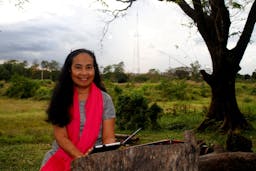Coffee Lessons
May 28, 2019
Story
The stove fire hisses blue as the dark bitterness overflows from the stainless Thai ewer that I bought on the sidewalk of Sharia Rokab in Ramallah, and I do just as you used to tell me: do nothing, do not stir.
Hadeel, I am doing this to remember you and the trapped villagers of Haris and Marda near the city of Ariel as I begin another year today, to remember your story of three unnamed uncles in the Gaza, the one you wanted to see so you can tell them your mother deserves her freedom in Texas, you wanted to find them in Khan Younis the afternoon you left us in Haris.
To make coffee the right way, I remember you tried to teach me, and you taught me how to say “qahweh,” and to choose: sugar or no sugar.
Qahweh.
Black, not because it suits my taste but because I grieve or are with the grieving.
I will serve qahweh the way Jamal served it to me in Balata, the day he buried his brother Ibrahim Issa and his brother’s best friend Mohammad Natour after they were gunned down while celebrating the latter’s 13th birthday on the rooftop, drinking qahweh at the sundown of their short, young lives.
I do not remember your favorite lines from Mahmoud Darwish, those that he recited in front of you in Sienna, Italy. But today, I will bring poetry’s white shallow cup to my mouth, Hadeel; even as its ebony taste is scalding my tongue.
But we know silence scalds, too. The green silence, for instance, of phones, like the stunned parakeets in the cage above Jamal’s headas he spoke of heroism and the bitterness of refugees whoyearn forthe scent of the incoming tides in the Sea of Galilee.
I will not put the cup down now, Hadeel, because, I do not need another cup of grief and I will not read my future held in the coffee grounds. I want it unknown, I want it.
Here, youare never safe, I was told in B’lin and yet I trusted the young Israeli soldiers to let me through the Wall. Not because I was free and already an old woman but because I was not Palestinian. Though by that time I already smelled faintly of zaatar and zetoun.
Qahweh, I drink you, and I remember the young girl who wore red at her Grandmother Siche’s funeral in Salay, Misamis Oriental and I remember Uder in Mamasapano, Maguindanao fearful of losing his toy horse that has lost its two front feet.
I have the names of the doctor’s daughters, ripe excelsa cherries safe in my memory’s palms, the five sisters who died in their sleep in Gaza: Tahrir, Ikram, Dina, Samer, Jawahar even as I do not remember anymore the names of the eight sisters in Deir Balllut, and their mother, as old as I am but wiser, knitting skullcaps paid for with four shekels each, the coins that bring her daughters on the bus and through the Zaatara checkpoint to the university near Ramallah.
I must tell you this: I am drinking now the cherished coffee stolen by foxes and reclaimed in their dung and I am told it makes a clean cup. I do not know how it happens but it happens.
Asyou left, Hadeel, Sameer told me not to scatter salt behind you nor the ground coffee we got from Ethiopia via the souk in Deir Estiya. Don’t, she said. But now I scatter to the ebbingMacajalar Bay the powder coffee from Vietnam brought by the friend who sings with his daughter the Boulevard of Broken Dreams in Hamburg, and I do not know. I do not know where this will bring the thousands that wars have killed these days. But I have not stopped hoping so I drink you, Qahweh.
What are you doing now, are you somewhere back inSingapore making qahweh and drinking it sweetened with wild honey as you conjure the designs of oil rigs in the Malacca Straits?
Tell me again howyou do it, how not to do anything, never, neverto stir.




